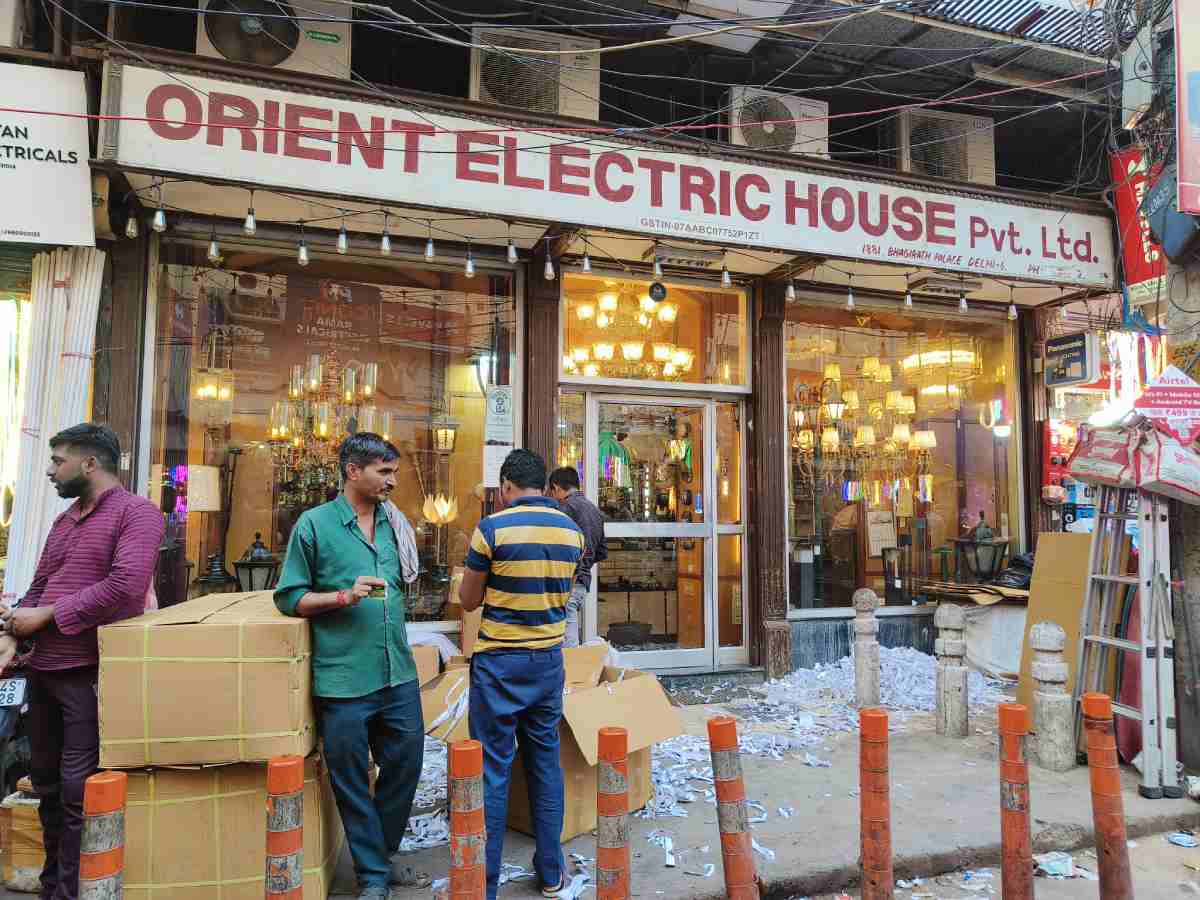
Orient Electric House was founded before India gained Independence
India: In the bustling heart of Delhi’s Chandni Chowk, where history and modernity collide, there lies a hidden gem known for bringing art into everyday spaces. A few months ago, Orient Electric House received an order for over 100 bespoke lights for the wedding of Mukesh Ambani’s son—an event that showcased the shop’s growing reputation for its mastery in creating unique lighting designs that tell a story of heritage and craftsmanship.
Renowned for its embroidered decorative lights, a concept no other store in Chandni Chowk offers, Orient Electric House has become a destination for art lovers and connoisseurs. Nestled within the narrow lanes of Bhagirath Palace electronic market, this iconic establishment has been illuminating homes since 1945, blending traditional Indian craftsmanship with contemporary aesthetics.
Founded before India gained independence, Orient Electric House has been an integral part of Chandni Chowk, merging traditional craftsmanship with modern needs. Popularly known online as “Fos Lighting,” the shop has carved out a niche by offering exquisite, hand-embroidered lighting that evokes the grandeur of Mughal designs and the vibrancy of Indian folk art.
Also read: Air pollution: Closed schools throttle livelihood of Delhi’s hawkers
“We’ve introduced a new style of decorative lighting that’s loved by all who see it. We offer both handmade and machine-made embroidered lights,” said Siddharth Rohatgi, the third generation owner of the shop. “We have talented artisans in Delhi who create exceptional embroidery work,” he added.
The prices for these embroidered lights range from Rs 3,000 to Rs 50,000, offering something for every taste and budget.
Stepping inside the shop, you are greeted by a blend of old-world charm and contemporary elegance. The lighting fixtures here are unlike anything found in typical stores—each piece is a testament to the dedication of artisans who delicately stitch embroidery onto lampshades, creating intricate patterns.
“We use embroidery not only to illuminate a space but to add a touch of heritage and elegance,” Rohatgi explained.
The embroidered lights, made with fine cotton and silk threads, come in various designs, including floral motifs inspired by nature.
Rohatgi draws inspiration from his own creativity and the cultural heritage around him. “My parents used to buy shawls, and I was inspired by the designs on them. I was never interested in regular jobs. I wanted to create something of my own, which is why I chose to design decorative lights through my imagination and run this family business,” said Rohatgi, who studied Mechanical Engineering at Manipal University.
Originally founded by Rohatgi’s grandfather, Hari Krishan, who lived in Chandni Chowk before relocating to Hauz Khas, the shop has witnessed Delhi’s evolution firsthand. Krishan, who passed away in 2020 at the age of 97.
As Delhi expanded, so did the shop’s reputation. Over the years, Orient Electric House became a household name, attracting a clientele that included prominent politicians, artists, and families seeking to bring a touch of Indian heritage into their homes. The shop’s unwavering commitment to quality and tradition has ensured its survival amid an ever changing world.
“Actors like Raj Babbar and Sonu Sood have visited us. Indian economist Montek Singh Ahluwalia and top businesswoman Shahnaz Husain were regular customers,” Rohatgi shared.
Orient Electric House is also a favourite in the hospitality industry, with several luxury hotels adorning their lobbies and rooms with custom-designed chandeliers, table lamps, and pendant lights. The shop frequently receives orders for bespoke lighting that tells a unique story or captures a moment of heritage.
“One of our proudest moments was when we received an order for over 100 lights for the wedding of Mukesh Ambani’s son Anant,” Rohatgi said.
Also read: Stolen childhood: The role of placement agencies in abuse and child labour
Another innovative concept Rohatgi has introduced is incorporating brass work and marble into the lighting designs. The shop features many lights made from these materials, blending the beauty of handcrafted elements with functional lighting.
At 47, Rohatgi remains deeply committed to preserving this rich heritage for future generations, ensuring that Orient Electric House continues to thrive, preserving its heritage while embracing new ideas.
In a city where modernisation often eclipses tradition, Orient Electric House stands as a shining example of how cultural heritage can blend seamlessly with innovation—lighting the path for generations to come.
Court allows 13-day interim bail to 2020 riots case accused with conditions barring media interaction…
Improvement in the first nine months gives way to higher fatalities by year-end
A 30-year-old English teacher died after being run over by a water tanker on the…
Biometric system aims to prevent repeat meals and ensure subsidised food reaches a larger pool…
Blending code, textile traditions and live performance, Alida Sun’s solo show reimagines computation as ritual…
Proclaimed offender arrested for impersonating IB officer, using forged MHA and police identity cards